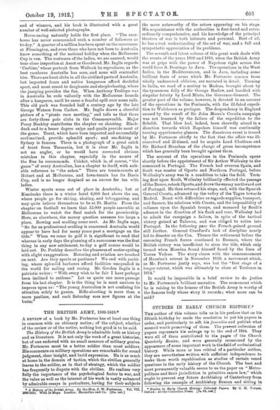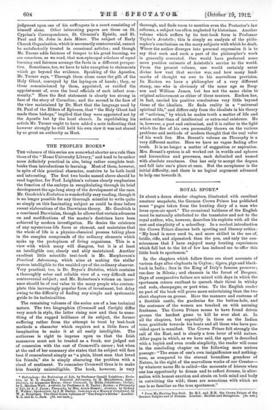STUDIES IN EARLY CHURCH HISTORY.*
THE author of this volume tells us in his preface that on his fiftieth birthday he made the resolution to put his papers in order, and particularly to sift his juvenilia and publish what seemed worth preserving of them. The present collection of papers represents his salvage up to the end of 1894. They were all of them contributed to the pages of the Church Quarterly Review, and were generally occasioned by the appearance of some important work in the field of eoclesiastioal history. While more or leas critical of a particular author, they are nevertheless written with sulleient independence to make them worth republication as studies of certain vexed questions in the early history of the Church. The best and most permanently valuable seems to us the paper on " Metro- politans and their jurisdiction in primitive canon law," which ought to prevent any future Archbishop of Canterbury from following the example of Archbishop Benson and sitting in • studies is Earle Church History' Coiloatott Papas. Ity O. H. Turps?, Oxford : At the Clarendon Prem. [ys. 6d. net.] judgment upon one of his suffragans in a court consisting of himself alone. Other interesting papers are those on St. Cyprian's Correspondence, St. Clement's Epistle, -and St. Paul and St. John in Asia Minor. The subject of Early Church Organization, which is necessarily controversial, cannot be satisfactorily treated in occasional articles ; and though Mr. Turner adds fairness of temper to his great learning, we are conscious, as we read, that non-episcopal scholars of equal learning and fairness arrange the facts in a different perspec- tive. Sometimes, too, we have to take exception to statements which go beyond the evidence. Speaking of the Apostles, Mr. Turner says, " Through, them alone came the gift .of the Holy Ghost, conveyed by the laying-on of hands ; they or those commissioned by them, appointed, or ratified the appointment of, even the local officials of each infant coin, inanity." Here the first statement is clearly too strong in face of the story of Cornelius ; and the second in the face of the view maintained by Dr. Hort that the language used by St. Paul of the Elders of Ephesus, that" the Holy Ghost had made them bishops," implied that they were appointed not by the Apostle but by the local church. In republishing, his article Mr. Turner ought to have added a note indicating that however strongly he still held his own view it was not shared by so great an authority as Hort.















































 Previous page
Previous page